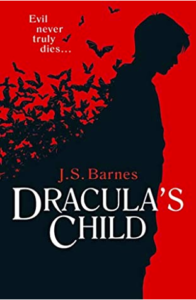Q. Every book has its own story about how it came to be conceived and written as it did. How did Dracula’s Child evolve?
I think it’s been evolving ever since I first read Stoker’s extraordinary novel at around eleven or twelve (oddly, and I suspect not entirely coincidentally, the same age as Quincey in my book!). More recently, I was asked to adapt the original story as faithfully as possible for an audio drama starring Mark Gatiss. It was this process of adaptation – of taking the narrative apart, seeing how it functions and putting it back together again in a slightly different shape – which led me to consider a direct sequel. It seemed to me almost as if Stoker had left deliberate clues for just such a follow-up. And it struck me as quite a mystery as to why he never attempted it himself!
 Q. Bram Stoker’s Dracula has been dissected for its depiction of a Victorian-era England fearful of foreign influence and the sexual liberation of women. What social themes, if any, did you find yourself considering while writing Dracula’s Child?
Q. Bram Stoker’s Dracula has been dissected for its depiction of a Victorian-era England fearful of foreign influence and the sexual liberation of women. What social themes, if any, did you find yourself considering while writing Dracula’s Child?
It’s such a rich, dense text, full of all of the fears of the age, a good many of which have barely shifted in more than a century. In my own story, I wanted to continue what Stoker had done much as he might have done so had he set himself the task. Of course, it’s inevitably the case that, writing as I was in the twenty-first century, I’d end up reflecting a few of the concerns and terrors which are unique (or, more accurately, which seem unique) to our own age.
Q. I enjoyed the overtly political nature of Dracula’s ascension to power in the pages of your novel. In particular, the scene with the motorist refusing to assist our heroes struck a chord. What inspired in you the greater ambition of this version of Dracula?
There’s a line in the original novel when Dracula describes himself as a man “who commanded nations”. This element of his complicated personality seems very much to have fallen into abeyance by the time that Stoker introduces us to him. I wondered how his defeat in the book might have affected his psyche – whether, having been so thoroughly rejected by modernity he might not reach back into the past, to a time when he was in his pomp, and seek to recreate it. Were this case, it’s not too great a stretch to imagine that there’d be plenty of folks who’d be very happy, for their own reasons, to aid him in that objective.
Q. Do you write with any particular audience in mind? Are there any particular audiences you hope will connect with this story?
I hope that the book has got a pretty wide appeal! Almost everyone knows something of Dracula, don’t they? And I’m hoping that plenty of them will want to meet him again… More specifically, I really hope that horror fans take to this. And readers who love a rich, Victorian/ Edwardian voice in their fiction. I’ve worked hard to make it sound as authentic as possible and I think/hope I’ve almost succeeded.
Q. What is the first book you read that made you think, “I have got to write something like this someday!”
Great question! For me, it was probably the Sherlock Holmes stories of Arthur Conan Doyle, read when I was very young. They’re incredibly potent pieces of fiction which have the power still to sweep up the reader and transport them.
Q. How did you learn to write?
I think I’m still learning! I was lucky to have a great education and to read English at university. There’s no tutor as good as reading the great novels of the past. The more you read and write, the better you get. I’ve also been fortunate in recent years to write a lot of stories set in shared universes – Doctor Who, Torchwood, Sherlock Holmes – and have learned an awful lot about story structure in the process.
Q. Your books to date have been heavily influenced by classic horror novels of the Victorian era. What made you choose “gaslamp” speculative fiction as your primary means of expression?
I think it probably chose me! I’ve always found myself drawn to that particular era, especially the very end of the nineteenth century. The fantastic literature of that period still feels so fresh and new. It’s an age which is pretty much inventing whole genres – SF and the detective story for starters – and there’s atmosphere and invention in every corner of the culture.
Q. Do you adhere to any particular writing regimen?
I like to write in the mornings. I write long-hand in a series of small, stout notebooks. I just can’t seem to connect to the sentences in the same way when typing. I’m a father of two now, though, so the available time for writing is getting seriously squeezed! Perhaps the laptop will beckon before long?
Q. Are you a pantser (someone who writes by the seat of their pants) or a plotter?
Very much a plotter. I’ve tried the “pantser” route and I’ve found that you simply end up wasting a lot of material because it doesn’t end up being usable in the book’s final form. It’s also very easy to become disheartened in a long project if you don’t have a clear idea of the trajectory of the story.
Q. What are you reading at the moment?
The best book I’ve read in a long while is Susanna Clarke’s Piranesi – a modern masterpiece, I think, ideally conceived and realised. I’ve also been dipping in and out Stephen King’s new collection, If It Bleeds (surely the most reliably entertaining writer of our times). Next up, I’ve got a new edition of Frank Herbert’s Dune and about six Maigret novels. In comics, I’ve been reading Geoff Johns’ Doomsday Clock and, for pure pleasure, the Marvel omnibus collections of 1970s Conan comics.
Q. Are there any new books or authors in speculative fiction that have you excited?
I’d put Piranesi in this bracket! That strange, unique writer Rob Shearman has a new book out – We All Hear Stories in the Dark – which looks astonishing. I love James Lovegrove’s Holmes pastiches, and he’s got another one ready in time for Christmas. Also on my TBR pile – Christina Henry’s The Ghost Tree.
Q. What can you tell us about your next project?
Not too much as it hasn’t been announced yet! I can confirm it’s not Dracula related (though this doesn’t rule out a return to his world in the future). It’s in a similar field, though, and is, in its own way, just as dark and bloody. More as soon as I’m allowed to tell you!
Author Links
~~~~~~~
Dracula’s Child was published on September 22nd, 2020 by Titan Books and is available from all good booksellers. My review of this remarkable pastiche may be found here.
~~~~~~~
Want it now? For the Kindle version, click here.

